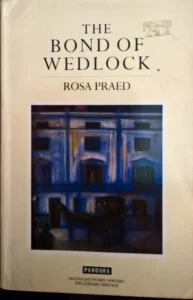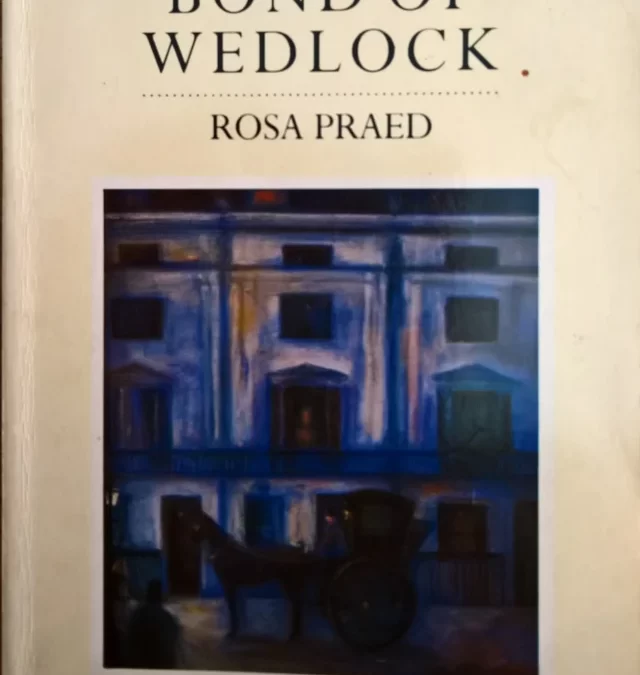by Bill Holloway Rosa Praed (1851-1935) was popular and prolific, with over 40 novels to her name. For a Victorian ‘romance’ novelist she had a surprisingly dismissive attitude to marriage, which is what makes The Bond of Wedlock (1887) so interesting.
Rosa Praed (1851-1935) was popular and prolific, with over 40 novels to her name. For a Victorian ‘romance’ novelist she had a surprisingly dismissive attitude to marriage, which is what makes The Bond of Wedlock (1887) so interesting.
We have covered Rosa Praed (1851-1935) a few times in these pages, not least because our colleague Jess White’s hybrid memoir, Hearing Maud (2019) is at least partly an exploration of Praed’s relationship with her daughter.
My interest in Praed arises from my M.Litt thesis, some years ago, The Independent Woman in Australian Literature. Praed, like a number of Australian women authors of the time – coinciding with suffragism and first wave feminism – wrote heroines who chose to live without marrying, or who, if married, were willing to walk away.
So, Catherine Helen Spence and Miles Franklin, for instance, encouraged young women to seek employment rather than marriage; Catherine Martin (An Australian Girl) saw marriage as a burden to be endured; Tasma, Louisa Lawson and Daisy Bates abandoned inconvenient husbands; and so on.
Praed is probably at the latter end of that spectrum. Anne Summers writes: “Rosa Campbell-Praed discarded any pretensions to critical accolades and created superb if implausible heroines… A revealing feature of her writings was her proclivity for having her female characters dispense with weak, cowardly or uninteresting men and take up, legally or otherwise, with more exciting characters.” (Damned Whores and God’s Police, 1975)
 Praed herself, left her husband and spent the remainder of her life with her companion, Nancy Hayward (daughter Maud stayed with her father and on his death was placed in an institution).
Praed herself, left her husband and spent the remainder of her life with her companion, Nancy Hayward (daughter Maud stayed with her father and on his death was placed in an institution).
To go back to the beginning, Rosa Praed was born into ‘comfortable’ circumstances on one of her father, Thomas Murray-Prior’s Queensland cattle stations, the third of eleven children (ADB). She was educated at home, by her mother and tutors. Her mother was the niece of poet Charles Harpur and the family had its own magazine to which Rosa contributed stories.
In 1872 Rosa was married from Government House, Brisbane to Arthur Campbell Bulkley Praed, younger son of an English banking and brewing family, and in 1876 they returned to England, to the family business in Northamptonshire. A few years later Rosa, having achieved some literary success, began living in London.
The Bond of Wedlock (1887) is the eleventh of Praed’s 45 novels. Re-written as the play Ariane it ran for 100 performances in the West End in 1888. Unlike many of her other works, it is a drawing room drama, set totally in London and does not draw on her experience of life in Australia. Its relevance today is that it is an important example of the attacks Australian women writers were making on the institution of marriage well before Miles Franklin’s famously anti-marriage My Brilliant Career (1901).
‘Ware Spoilers. In The Bond of Wedlock Ariana, a beautiful young woman has been forced by the loss of her father’s fortunes (or rather, by her father’s dissipation of his father’s “great tallow business”) to forgo her expectations of marrying into the minor aristocracy and instead has married Harvey Lomax, “the junior partner in a house of business in the City”. After nine years of ongoing ‘financial crises’ caused by overspending they have one child of 7 or 8 years and Ariana has learnt that “if my marriage has been a mistake, I ought to have learnt in nine years that the only thing I can do is make the best of it.”
But is that “the only thing”? She has a rich friend, Sir Leopold D’Acosta, who visits her frequently, sends her gifts and makes ‘loans’ to her father. Lomax, constantly irritated by Ariana’s indifference to him, and infuriated because she will not ask D’Acosta for a loan to help him out, strikes her one night in a drunken rage.
Her father and D’Acosta see the bruises and arrange with Babette, D’Acosta’s former mistress, for Lomax to be caught out in adultery. Lomax agrees not to contest a divorce and Ariana marries D’Acosta.
Babette, once an artists’ model, is now the wife of a German painter, in that Bohemia on the edge of and mixing with the English gentry. She is bored and Praed imagines for her a different sort of independence –
[I want] to come home as late as I please, and let myself in with a latch-key, and go to bed when I like, and get up when I like, and no one to have a right to ask me any questions. That is what I want; it isn’t wickedness … so much as freedom. That is the way with many of us women whom the world calls bad. We should do no harm if only we were free to do what we like.
Meanwhile, Praed does not argue that Ariana might have remained single but neither is marriage, even to a millionaire, an unalloyed pleasure.
[Ariana] did a certain amount of languid shopping. She drove a certain number of times up and down the Ladies’ Mile. She talked all her conventional society talk. She had her admirers, whom she treated in somewhat haughty fashion… She dined out in the smartest houses, and she went to the smartest balls and receptions. She sometimes thought with a shudder of [her previous] little house in Elizabeth Street.
Ariana genuinely loves D’Acosta but begins to suspect that he no longer loves her in return. When she confronts him he replies,“You are a little unreasonable aren’t you? … One doesn’t suppose that a honeymoon lasts forever. I had an idea that we were a fairly affectionate couple, as couples go. I congratulated myself upon having married a woman of sense and experience.”
Shortly after, her father lets slip the details of Lomax’s entrapment and Ariana conveys to D’Acosta that they will forthwith maintain only the appearance of marriage, “‘We can be very good friends on the outside. We need never be anything more.’ ‘I think you are wise,’ he answered, and not another word was spoken …”
One of the advantages of reissues is that they often come with an interesting introductory essay, in this case by Lynne Spender. Her conclusion is that:
Obviously, Praed saw women of her time as damned if they did conform to society’s standards and damned if they did not. In neither case could they exist as free and independent beings…
Ariana and Babette take different paths. If either of them finds independence it is nevertheless limited by their reliance on men to support them. Praed here is stating the problem, other Australian women authors proposed at least partial solutions. The Australian literary community, taking its lead from the misogynist Bulletin, suppressed these writers for the best part of a century.
.
Rosa Praed
The Bond of Wedlock
first pub. 1887. Reissued by Pandora, Sydney, 1987
137pp
Bill Holloway, the author of this essay, blogs at The Australian Legend. He is an old white guy the subject of whose (very) mature age M.Litt thesis was ‘The Independent Woman in Australian Literature’.





